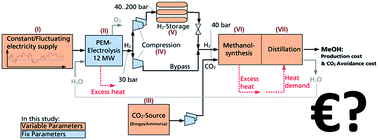Economics & carbon dioxide avoidance cost of methanol production based on renewable hydrogen and recycled carbon dioxide – power-to-methanol
Abstract
The synthesis of sustainable methanol based on renewable electricity generation, sustainable hydrogen (H2) and recycled carbon dioxide (CO2) represents an interesting sustainable solution to integrated renewable energy storage and platform chemical production. However, the business case for this electricity based product (denoted hereafter as eMeOH) under current market conditions (e.g. vs. conventional fossil methanol (fMeOH) production cost) and the appropriate implementation scenarios to increase platform attractiveness and adoption have to be highlighted. The aim of the following study was to perform a dynamic simulation and calculation of the cost of eMeOH production (where electricity is generated at a wind park in Germany), with comparison made to grid connected scenarios. Consideration of these scenarios is made with particular respect to the German energy market and potential for the reduction in fees/taxes (i.e. for electrolyser systems). This evaluation and indeed the results can be viewed in light of European Union efforts to support the implementation of such technologies. In this context, CO2 is sourced from EU relevant sources, namely a biogas or ammonia plant, the latter profiting from the resulting credit arising from CO2 certificate trading. Variation in electricity cost and the CO2 certificate price (in the presented sensitivity study) demonstrate a high cost reduction potential. Under the energy market conditions of Germany it is found that eMeOH production costs vary between €608 and 1453 per tonne based on a purely grid driven scenario, whilst a purely wind park supplied scenario results in €1028–1067 per tonne. The reported results indicate that the eMeOH production cost in Germany is still above the present (although variable) market price, with the economical evaluation indicating that electrolyser and H2 storage represent the lion share of investment and operational cost. Substitution of fMeOH results in CO2 avoidance costs between €365 and 430 per tonne of CO2eq avoided for green methanol produced in Germany. The presented assessment indicates that the eMeOH production cost in Germany will reach market parity in ca. 2030–2035 with the price for the avoidance of CO2eq turning from a cost to a benefit at around the same time. Optimistically, the cost is predominantly influenced by rapidly reducing renewable electricity costs as is already the case in South American and Arabic countries offering the potential for methanol production at a cost of <€500 per tonne.



 Please wait while we load your content...
Please wait while we load your content...